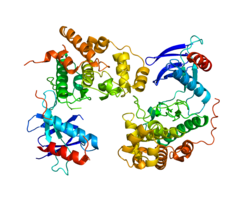Mitogen-activated protein kinase 9
Mitogen-activated protein kinase 9 is an enzyme that in humans is encoded by the MAPK9 gene.[5]
Function
[edit]The protein encoded by this gene is a member of the MAP kinase family. MAP kinases act as an integration point for multiple biochemical signals, and are involved in a wide variety of cellular processes such as proliferation, differentiation, transcription regulation and development. This kinase targets specific transcription factors, and thus mediates immediate-early gene expression in response to various cell stimuli. It is most closely related to MAPK8, both of which are involved in UV radiation-induced apoptosis, thought to be related to the cytochrome c-mediated cell death pathway. This gene and MAPK8 are also known as c-Jun N-terminal kinases. This kinase blocks the ubiquitination of tumor suppressor p53, and thus it increases the stability of p53 in nonstressed cells. Studies of this gene's mouse counterpart suggest a key role in T-cell differentiation. Four alternatively spliced transcript variants encoding distinct isoforms have been reported.[6]
Interactions
[edit]Mitogen-activated protein kinase 9 has been shown to interact with:
References
[edit]- ^ a b c GRCh38: Ensembl release 89: ENSG00000050748 – Ensembl, May 2017
- ^ a b c GRCm38: Ensembl release 89: ENSMUSG00000020366 – Ensembl, May 2017
- ^ "Human PubMed Reference:". National Center for Biotechnology Information, U.S. National Library of Medicine.
- ^ "Mouse PubMed Reference:". National Center for Biotechnology Information, U.S. National Library of Medicine.
- ^ Kallunki T, Su B, Tsigelny I, Sluss HK, Dérijard B, Moore G, Davis R, Karin M (Dec 1994). "JNK2 contains a specificity-determining region responsible for efficient c-Jun binding and phosphorylation". Genes & Development. 8 (24): 2996–3007. doi:10.1101/gad.8.24.2996. PMID 8001819.
- ^ "Entrez Gene: MAPK9 mitogen-activated protein kinase 9".
- ^ Saleem A, Datta R, Yuan ZM, Kharbanda S, Kufe D (Dec 1995). "Involvement of stress-activated protein kinase in the cellular response to 1-beta-D-arabinofuranosylcytosine and other DNA-damaging agents". Cell Growth & Differentiation. 6 (12): 1651–8. PMID 9019171.
- ^ Kharbanda S, Saleem A, Shafman T, Emoto Y, Taneja N, Rubin E, Weichselbaum R, Woodgett J, Avruch J, Kyriakis J (Aug 1995). "Ionizing radiation stimulates a Grb2-mediated association of the stress-activated protein kinase with phosphatidylinositol 3-kinase". The Journal of Biological Chemistry. 270 (32): 18871–4. doi:10.1074/jbc.270.32.18871. PMID 7642542.
- ^ a b Yasuda J, Whitmarsh AJ, Cavanagh J, Sharma M, Davis RJ (Oct 1999). "The JIP group of mitogen-activated protein kinase scaffold proteins". Molecular and Cellular Biology. 19 (10): 7245–54. doi:10.1128/mcb.19.10.7245. PMC 84717. PMID 10490659.
- ^ Whitmarsh AJ, Cavanagh J, Tournier C, Yasuda J, Davis RJ (Sep 1998). "A mammalian scaffold complex that selectively mediates MAP kinase activation". Science. 281 (5383): 1671–4. Bibcode:1998Sci...281.1671W. doi:10.1126/science.281.5383.1671. PMID 9733513.
- ^ Ito M, Yoshioka K, Akechi M, Yamashita S, Takamatsu N, Sugiyama K, Hibi M, Nakabeppu Y, Shiba T, Yamamoto KI (Nov 1999). "JSAP1, a novel jun N-terminal protein kinase (JNK)-binding protein that functions as a Scaffold factor in the JNK signaling pathway". Molecular and Cellular Biology. 19 (11): 7539–48. doi:10.1128/mcb.19.11.7539. PMC 84763. PMID 10523642.
- ^ Kelkar N, Gupta S, Dickens M, Davis RJ (Feb 2000). "Interaction of a mitogen-activated protein kinase signaling module with the neuronal protein JIP3". Molecular and Cellular Biology. 20 (3): 1030–43. doi:10.1128/mcb.20.3.1030-1043.2000. PMC 85220. PMID 10629060.
- ^ Hu MC, Qiu WR, Wang YP (Nov 1997). "JNK1, JNK2 and JNK3 are p53 N-terminal serine 34 kinases". Oncogene. 15 (19): 2277–87. doi:10.1038/sj.onc.1201401. PMID 9393873.
- ^ Lin Y, Khokhlatchev A, Figeys D, Avruch J (Dec 2002). "Death-associated protein 4 binds MST1 and augments MST1-induced apoptosis". The Journal of Biological Chemistry. 277 (50): 47991–8001. doi:10.1074/jbc.M202630200. PMID 12384512.
- ^ Maekawa M, Nishida E, Tanoue T (Oct 2002). "Identification of the Anti-proliferative protein Tob as a MAPK substrate". The Journal of Biological Chemistry. 277 (40): 37783–7. doi:10.1074/jbc.M204506200. PMID 12151396.
Further reading
[edit]- Lin A (2006). "The JNK Signaling Pathway (Molecular Biology Intelligence Unit)". Landes Bioscience. 1: 1–97. ISBN 978-1587061202.
- Davis RJ (2000). "Signal transduction by the JNK group of MAP kinases". Cell. 103 (2): 239–52. doi:10.1016/S0092-8674(00)00116-1. PMID 11057897. S2CID 343677.
- Liu J, Lin A (2007). "Wiring the cell signaling circuitry by the NF-kappa B and JNK1 crosstalk and its applications in human diseases". Oncogene. 26 (22): 3267–78. doi:10.1038/sj.onc.1210417. PMID 17496921. S2CID 28428831.
External links
[edit]- MAP Kinase Resource Archived 2021-04-15 at the Wayback Machine.
This article incorporates text from the United States National Library of Medicine, which is in the public domain.


 French
French Deutsch
Deutsch





